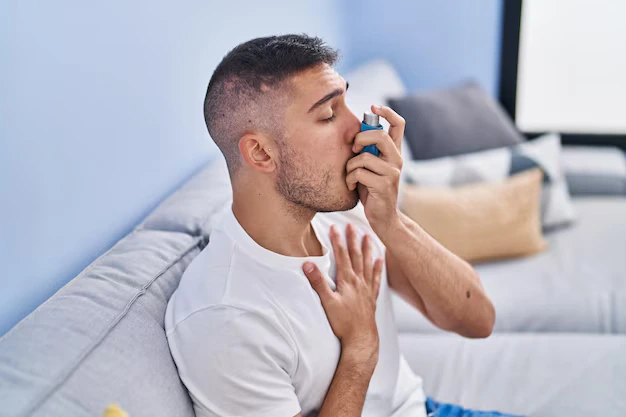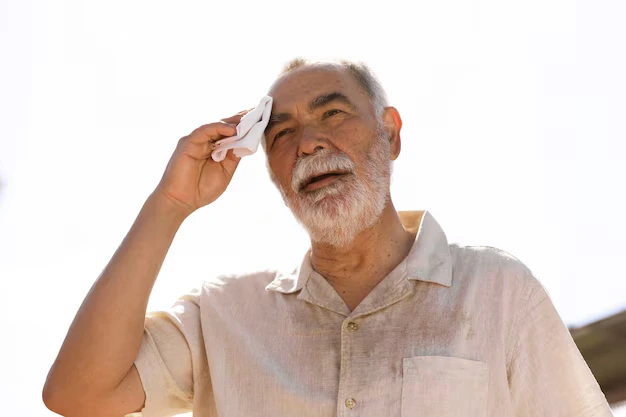As the scorching sun beats down and temperatures soar, many of us seek refuge in air-conditioned spaces or indulge in refreshing ice creams. However, for individuals with asthma, a heatwave can bring more than just discomfort – it can trigger potentially serious health issues. Let’s delve into how heatwaves impact asthma, what are heat- induced asthma symptoms and understand our body’s response to these extreme weather conditions.
The connection between heatwaves and asthma attacks

Heatwaves can significantly impact individuals with asthma. Here’s how:
- Increased Air Pollution
High temperatures during a heatwave often lead to increased levels of air pollution, including ozone and particulate matter, which can irritate the airways and trigger asthma attacks. - Dry Air
Heatwaves often bring dry, hot air, which can dry out the respiratory tract, making it harder to breathe and leading to asthma symptoms like wheezing and shortness of breath. - Excessive Pollen Levels
During hot weather, pollen levels tend to rise, which can worsen asthma symptoms, especially for those who have allergies. Pollen can trigger inflammation in the airways, causing asthma attacks. - Changes in Humidity
Heatwaves can cause fluctuations in humidity levels. High humidity can make breathing more difficult for asthma sufferers, as it can lead to increased airway inflammation and discomfort. - Increased Exposure to Triggers
During heatwaves, people are more likely to spend time outdoors, exposing themselves to asthma triggers like smoke, dust, and pollen. Physical exertion in the heat can also strain the lungs, further increasing the risk of an asthma attack. - Dehydration
Heatwaves can lead to dehydration, which may thicken mucus in the airways, making it harder to clear out irritants and triggering asthma symptoms.
Symptoms of Heat-Induced Asthma
Heat-induced asthma is triggered by high temperatures and environmental factors, which can cause the following symptoms:
- Wheezing
A high-pitched sound while exhaling, caused by narrowed airways, is common during asthma flare-ups triggered by heat. - Shortness of Breath
Difficulty breathing or feeling out of breath, especially during physical activity or when exposed to hot, dry air, is a common sign of heat-induced asthma. - Coughing
Persistent coughing, especially in the morning or at night, can indicate asthma worsening due to heat and dry air affecting the respiratory system. - Chest Tightness
A sensation of pressure or tightness in the chest is a common symptom, often feeling like the chest is being squeezed, particularly in hot conditions. - Increased Mucus Production
Excessive mucus production in the airways, which can make breathing harder, is another symptom of heat-induced asthma.
If any of these symptoms occur during a heatwave or extreme temperatures, it’s essential to take action—using medication, staying hydrated, and avoiding outdoor activities during peak heat can help manage symptoms. Always follow your doctor’s guidance and seek medical attention if symptoms become severe
Tips for managing asthma during a heatwave

- Stay Indoors During Peak Heat
During day (typically between 10 a.m. and 4 p.m.), stay indoors as much as possible. The air quality is usually worse during these hours, and it can trigger asthma symptoms. - Use Air Conditioning or Fans
Keep your indoor environment cool and ventilated by using air conditioning or fans. Air conditioning can help filter out pollutants and allergens, reducing asthma triggers. - Keep Windows Closed
During a heatwave, keeping windows closed can help prevent hot air, pollen, and pollutants from entering your home, which can trigger asthma symptoms. - Stay Hydrated and focus on your diet
Drink plenty of water throughout the day to prevent dehydration, which can thicken mucus in the airways and make breathing harder. Avoid caffeinated or alcoholic drinks as they can cause dehydration. Make a diet chart of food to eat during heatwaves. - Monitor Air Quality
Pay attention to local air quality reports and avoid going outside when pollution levels or pollen counts are high. Use air quality apps or websites to track conditions. - Wear a Face Mask
If you must go outdoors, consider wearing a mask to reduce exposure to pollen, dust, and other air pollutants that can worsen asthma symptoms. - Avoid Strenuous Activities
Limit physical exertion during extreme heat. Exercise in the early morning or evening when temperatures are cooler. If you need to exercise, do so indoors or in a climate-controlled space. - Use Your Inhaler as Prescribed
Always carry your rescue inhaler and use it according to your doctor’s instructions. Preventive medications should also be taken regularly to reduce inflammation and manage symptoms.
By following these tips, you can help manage asthma symptoms during a heatwave and minimize the risk of asthma attacks. Always consult your professional for personalized advice .
Prevention Methods for Avoiding Severe Asthma Symptoms
- Follow Your Asthma Action Plan
Stick to your asthma action plan as prescribed by your doctor. Regularly monitor asthma symptoms such as wheezing, shortness of breath, and chest tightness to detect early signs of an attack. - Use Preventive Medication Regularly
Take your prescribed controller medications daily to help reduce inflammation in the airways. Consistent use can prevent coughing, wheezing, and increased mucus production, which are common asthma symptoms. - Monitor Your Breathing
Check your peak flow regularly with a peak flow meter to stay on top of your asthma. This can help you notice any decrease in lung function, such as difficulty breathing or shortness of breath, before symptoms worsen. - Avoid Known Triggers
Stay away from asthma triggers such as smoke, dust, pollen, or strong odors, which can increase inflammation in the airways. These triggers often worsen symptoms like coughing, wheezing, and chest tightness. - Maintain a Healthy Environment
Keep your living space free of allergens. Using air purifiers and keeping windows closed can reduce pollen levels and other pollutants that could trigger asthma symptoms like coughing or shortness of breath. - Stay Active, But Know Your Limits
Exercise can improve lung function, but be mindful of your asthma. If you feel any wheezing or tightness in your chest, stop and use your inhaler if needed. Avoid outdoor exercise during high-pollen days or extreme heat.
By consistently following these prevention methods, you can reduce the risk of severe asthma symptoms and enjoy better control over your condition. Always consult with doctor personalized advice.
Importance of staying hydrated and cool during a heatwave

During a heatwave, it is crucial to stay hydrated and cool to protect your body, especially if you have asthma. Dehydration can exacerbate asthma symptoms and make it harder to breathe. Drinking plenty of water throughout the day helps keep your airways moist and reduces the risk of triggering an asthma attack.
Additionally, staying cool is essential in managing asthma during extreme heat. Heat can lead to increased inflammation in the airways, making breathing more difficult for individuals with respiratory conditions like asthma. Find ways to stay cool such as using fans or air conditioning, seeking shade outdoors, or taking cool showers.
Avoiding activities that may cause overheating is also important. Try to schedule outdoor activities during cooler times of the day and take breaks in shaded areas when needed. Dress in lightweight clothing and use a damp cloth on your skin to help regulate body temperature effectively.
Remember that keeping your body hydrated and cool during a heatwave not only benefits your overall health but also plays a significant role in managing asthma symptoms effectively amidst challenging weather conditions.
Conclusion: Taking care of your health during extreme weather conditions
It is vital to prioritize your health during extreme weather conditions, especially during heat waves when asthma symptoms can worsen. By understanding how your body reacts to the heat and taking proactive measures to manage your asthma, you can help prevent severe complications and enjoy a better quality of life even in challenging circumstances. Remember to stay hydrated, keep cool, follow your asthma action plan diligently, and seek medical attention if needed. Your health is precious – take care of it!



